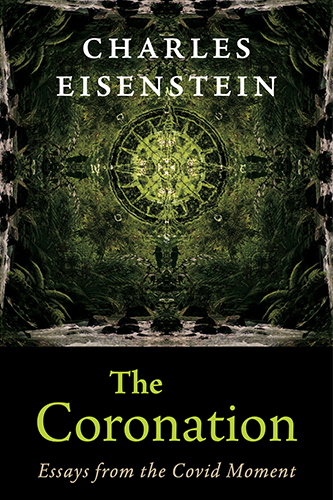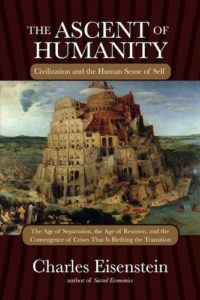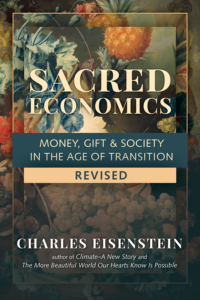Climate — A New Story
Chapters
Chapter 1: A Crisis of Being
The Fight
None of the above is to deny that horrible things are happening to life on this planet. Someone is bulldozing the trees, draining the wetlands, bottom-trawling the fish, and polluting water, air, and soil. Each time, that someone is a human being.
Since most of the damage happens at the behest of large corporations, it seems reasonable to name them as the enemy. Expose their immoral behavior! Hold them to account! Deter their crimes with meaningful penalties! Get their money out of politics! Then we can at least reduce their worst excesses.
This argument is reasonable under current conditions, but it accepts as unchangeable the very things we must change. I’ll offer some specifics later in the book; for now, a generality: fighting the enemy is futile when you inhabit a system that has the endless generation of enemies built into it. That is a recipe for endless war.
If that is to change, then one of the addictions—more fundamental than the addiction to fossil fuels—that we are going to have to give up is the addiction to fighting. Then we can examine the ground conditions that produce an endless supply of enemies to fight.
The addiction to fighting draws from a perception of the world as composed of enemies: indifferent forces of nature tending toward entropy, and hostile competitors seeking to further their reproductive or economic self-interest over our own. In a world of competitors, well-being comes through domination. In a world of random natural forces, well-being comes through control. War is the mentality of control in its most extreme form. Kill the enemy—the weeds, the pests, the terrorists, the germs—and the problem is solved once and for all.
Except that it never is. World War I—the “war to end all wars”—was followed by another, even more horrific, soon after. Nor did evil disappear after the defeat of the Nazis or the fall of the Berlin Wall. The collapse of the Soviet Union was, however, a crisis for a society that had come to define itself through its enemies; thus followed a desperate search for a new enemy in the early 1990s that resulted in the feeble candidate of “Colombian drug lords” for a time before settling on “terror.”
The War on Terror gave a new lease on life to a culture built on war-making; indeed it seemed to offer the prospect of permanent war. Unfortunately for the military-industrial complex, the public seems to be growing less terrified of terror, necessitating a series of new threats by which to maintain a climate of fear. It is hard to say that the scare campaigns of the last few years—Russian hackers, Islamic terror, Ebola, the Zika virus, Assad’s chemical weapons, and Iran’s nuclear program, to name a few—have not worked. The media at least clangs the alarm, and the public seems to have gone along with the policies that these campaigns justify, such as massive spraying programs in Florida to “combat Zika.” However (and this may in part be a function of my countercultural social circles), I have not seen much actual fear about these things, nothing like the palpable dread of the Soviet Union that was nearly universal in my childhood. The public discounts pretty much anything the authorities say, including the fear-mongering. Its apathy permits the governing elites to pursue their programs of control, but no longer do they channel and harness real fear. Is anyone outside the political classes actually afraid of Iran, Bashar al-Assad, or Vladimir Putin? One suspects that neither are the politicians, though they may display a semblance of alarm as a political posture.
I bring up the waning power of scare tactics because the effort to halt ecological collapse uses many of these very same scare tactics. The primary climate change narrative is basically, “Trust us, bad things will happen if we don’t hurry up and make big changes. It’s almost too late—the enemy is at the gates!” I want to question the assumption that we can and should motivate the public with fear-based appeals to self-interest. What about the opposite? What about appeals to love? Is life on earth valuable or sacred in its own right, or only in its utility to ourselves?
Climate change activism abounds in war narratives, war metaphors, and war strategies. The reason, aside from the deep-seated habits of the Story of Separation, is the desire to inspire the fervor and commitment that people display in wartime. Following the rhetorical template of war, we invoke an existential threat.
I don’t think it is working. I hesitate to use the term “climate change” in my essay titles. The last time I did so, one reader wrote to me saying, “I almost didn’t read your post because it had the words climate change in the title, and I’m just so sick of hearing the same thing over and over again.”
Maybe we are becoming war-weary. Does it take more and more exhortation to goad you into joining another battle? Have you encountered burnout, when no new horror can stimulate you to the kind of engagement you practiced a few years ago? Burnout seems the downfall of activists, but as the story of the man lost in a maze implies, it can be a necessary initiation into a wholly different mode of engagement.
My friend Pat McCabe, a Diné (Navajo) woman and longtime student of the Lakota Way, puts it this way: “When you reach the end of your resource, then the magic happens.” When we exhaust what we know, then what we don’t know becomes possible.
Struck with grief at the ruin of life on earth, one might understandably take offense at any suggestion that we “give up the fight.” To someone steeped in war mentality, to give up the fight means to withdraw from action. I’m suggesting we give up the fight in another sense: as the orienting principle of our efforts to heal the earth. There may still be battles, but we will access much greater power to heal when we frame the issue in terms of peace.
It is often observed that the last major war to unambiguously achieve its objectives was World War II. Since then, military conflicts have usually ended in stalemate, quagmire, or defeat for the stronger power. The failure of, for example, the U.S. war in Afghanistan is not due to inferior weaponry. It is that its weaponry is insufficient to its objective, which cannot be achieved by force. Guns and bombs cannot usually bring stability, “win hearts and minds,” or make a country pro-American, unless it is an unambiguous case of saving people from evil despots or aggressors.[5 ] To justify war, we have to fit every situation into that storyline, as the media has tried to do in every conflict since Vietnam.
The same goes for nonmilitary wars. In my lifetime I’ve heard declarations of a War on Poverty, a War on Cancer, a War on Drugs, a War on Terror, a War on Hunger, and now a War on Climate Change. None of these have been any more efficacious than the War in Iraq.
If the “fight” against climate change is a war, it is clear which side is winning. Greenhouse gas emissions have relentlessly increased since they were first widely acknowledged as a problem in the late 1980s. Deforestation has also continued and in some places even accelerated since then. Nor has any progress been made in altering the basic fossil-fuel-dependent infrastructure of society. If war were the only answer, then we would have to respond by fighting even harder. If there is another way, then the habit of fighting becomes an obstacle to victory.
In the case of ecocide, the mentality of war is not only an obstacle to healing, it is an intimate part of the problem. War is based on a kind of reductionism: it reduces complex interconnected causes—that include oneself—to a simple, external cause called the enemy. Furthermore, it normally depends on the reduction of the enemy to a degraded caricature of a human being. The demonization and dehumanization of the enemy is little different from the desacralization of nature upon which ecocide depends. To render nature into an other undeserving of reverence and respect, an object to dominate, control, and subjugate, is of a kind with the dehumanization and exploitation of human beings.
Respect for nature is inseparable from respect for all beings, including the human. It is impossible to cultivate one without the other. Climate change, therefore, calls us to a greater transformation than a mere change in our energy sources. It calls us to transform the fundamental relationship between self and other, including but not limited to the relation between the collective self of humanity and its “other,” nature.
The philosophically inclined reader may protest that self and other are not really separate, or that the human/nature distinction is an artificial, false, and destructive binary, an invention of the modern mind. Indeed, “nature” as a separate category suggests that we humans are unnatural and, therefore, potentially exempt from nature’s laws. Whatever the underlying metaphysics, what is changing is our mythology. We never were separate from nature and never will be, but the dominant culture on earth has long imagined itself to be apart from nature and destined one day to transcend it. We have lived in a mythology of separation.
Part of the mythology of separation is a belief in nature-as-thing; in other words, the belief that only human beings are possessed of full selfhood. This is what licenses us to exploit the beings of nature for our own ends, much as dehumanization of brown people licensed lighter-skinned people to enslave them.
The dominant culture’s recognition of who counts as a fully subjective, conscious, and worthy self has been expanding now for several hundred years. Two or three centuries ago, only a propertied white male was a full subject. Then that category was expanded to include all white males. Eventually it expanded again to include women as well, and people whose skin is not white. Then along came the animal rights movement, which said that animals too have consciousness, subjectivity, and an inner life, and should not therefore be treated as mere brutes or meat-machines. More recently, remarkable scientific discoveries have emerged around plant intelligence, mycelial intelligence, soil intelligence, forest intelligence, and even the capacity of water to hold and transmit complex, dynamic patterns of information. These discoveries seem to be converging on the universal indigenous belief that everything is alive and aware.
Just as bigotry and ecocide both depend on the dehumanization or “de-selfing” of the other, so also is the reversal of both part of the same movement toward a Story of Interbeing. Again, that term goes beyond mere interconnectedness or interdependency, to say that we are existentially connected to all other beings and to the world at large. My very being partakes in your being, and in the being of the whales, the elephants, the forests, and the oceans. What happens to them happens as well to me, on some level. When a species goes extinct something dies in us too; we cannot escape the impoverishment of the world we live in.
This applies equally to ecological, economic, and political well-being. The days of colonialism and imperialism—in which the wealth of one nation was built on the plunder of others—are dwindling. The era of thinking that human wealth could be built on the plunder of nature is nearly over too. Certainly, the outward structures of both kinds of plunder seem as robust as ever, even expanding to new extremes. However, their ideological core has hollowed out. Our converging crises are initiating humanity into the new and ancient mythology of interbeing.
Later I will argue that the reality of the climate crisis is different from our common perception of it. Yet perceptions are important. The core truth of climate change is that we are at the end of an era. We are at the end of the Age of Separation. It is a transition that has been under way for three generations now, inaugurated by the most extreme of all possible technologies of control applied at the very pinnacle of Total War. I am speaking, of course, of the Bomb.
The Age of War properly came to an end in 1945, when for the first time in history human beings developed a weapon too terrible to use. It took two horrific applications of the atomic bomb to set the stage for decades of “mutually assured destruction,” a glimmering of the evolutive realization that what we do to the Other, we do to ourselves. For the first time in history, total war between the great powers was impossible. Today, aside from an unregenerate minority, no one contemplates using nuclear weapons even in cases where retaliation is unlikely. Radioactive blowback makes large-scale use unthinkable, but there is another thing that holds us back too. We name it, perhaps, conscience or ethics, but history makes it tragically clear that conscience or ethics alone are not enough to stop the foolish and the horrific. No, something else has changed.
What has changed, I believe, is that the consciousness of interbeing is dawning in the dominant civilization. What we do to the Other, we do to ourselves. This will be the defining understanding of the next civilization—if there is a next civilization. Right now we (usually in this book, when I say “we” I mean the dominant culture on this planet) are facing lesson number two in the curriculum of interbeing. Lesson one was the Bomb. Lesson two is climate change.
End Notes
[5] Some argue that the true objective of recent wars has been to sow chaos and destroy the ability of sovereign governments to resist neoliberal free trade policies and imperialist geopolitical objectives. In that analysis, some wars such as the one that dismembered Yugoslavia or destroyed Libya were a great success. Nonetheless, the point still applies that the tools of war are becoming impotent to achieve what we say and believe we want.






